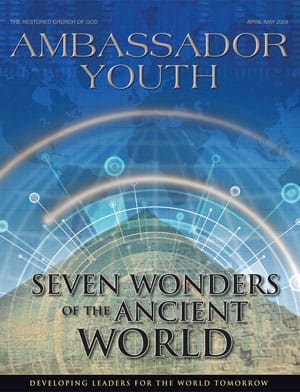King Hezekiah was dying. Isaiah the prophet came to his deathbed and said, ‚ÄúPut your affairs in order. The Eternal has said you will not recover. You will die.‚ÄĚ
The king turned to God in prayer, tearfully pleading for more time.
God heard Hezekiah and granted him 15 more years!
Upon learning this, King Hezekiah made his 12-year-old son Manasseh coregent, ruling alongside his father to accelerate the boy’s preparation for kingship. Hezekiah had much to teach, and wished his legacy to be one of righteous obedience to God’s Law.
During Hezekiah‚Äôs reign, he ‚Äúdid that which was right in the sight of the Lord, departed not from following Him,‚ÄĚ and ‚Äúkept His commandments.‚ÄĚ Hezekiah rid Judah of idol worship, removing high places, breaking false-religious images, and cutting down the pagan groves of fertility goddess Asherah (II Kings 18:4-6).
After 15 years of training his son, Hezekiah died as the Eternal had said.
But Manasseh was nothing like his father. Upon taking the throne, in his late twenties, the new king began a reign marked by idolatrous pursuits. Instead of the ways of God, Manasseh preferred pagan Gentile traditions and rituals. He rebuilt the high places Hezekiah had destroyed, erected altars for Baal worship, and made a wooden image of Asherah and placed it in the Temple. He ignored his father‚Äôs instructions about God, worshipping the stars instead‚ÄĒhe even built altars for them in the two courts of God‚Äôs Temple in Jerusalem! Manasseh pursued witchcraft, cast spells, and dealt with wizards and demons. Worse, Manasseh sacrificed his son as a burnt offering to the god Molech!
The people of Judah gladly followed their leader’s every move. Like a deadly plague, idolatry, debauchery and wickedness spread throughout the kingdom. Under Manasseh, God’s people committed acts even worse than those of the surrounding nations (II Kings 21:11).
As king, Manasseh‚Äôs poor character corrupted the entire nation of Judah. His example made the kingdom sink to new lows. The rest of Manasseh‚Äôs life reveals how deeply this leader‚Äôs example affected the people‚ÄĒand the painful lesson he learned after years of disobedience.
Conquered and Enslaved
God was furious! He sent Isaiah and other prophets to warn King Manasseh and condemn the nation‚Äôs idolatrous ways (II Kings 21:12-15). Through His loyal servants, God said, ‚ÄúBehold, I will bring such calamity upon Jerusalem and Judah that the ears of whoever hears of it will tingle. Jerusalem will be measured by the standard of My word, just as I had done with Samaria and the house of Ahab‚ÄĒand I will wipe Jerusalem as a man wipes a dish and turns it upside down. I will forsake My people, the remnant of My inheritance, and will deliver them into the hand of their enemies. They shall become a prey‚ÄĒa spoil to be plundered. For ever since I brought them out of Egypt, they have done evil in My sight and have provoked Me to anger!‚ÄĚ
Despite these warnings and God’s great patience, Manasseh and his subjects did not listen or change. Instead, the king persecuted God’s servants, authorizing a vicious killing spree that shed much innocent blood. (Ancient tradition says the king executed the prophet Isaiah, sawing him in two within a hollow log. Hebrews 11:37 may include a reference to this martyrdom.)
As punishment, God moved the king of Assyria to send his army and top officers to arrest Manasseh. They bound the wicked king with bronze chains and led him away with ropes attached to hooks that pierced his lip and nose. The Assyrians took Manasseh to Babylon, which they had conquered after the Babylonians rebelled against them.
Humiliated, removed from his seat of power, and taken away from his family, friends and subjects, Manasseh was alone, a prisoner in a faraway land.
The king suffered torture at the hands of Assyrians, who dealt harshly with any captured king. (The Assyrians treatment of King Zedekiah in II Kings 25:7 shows their vicious brutality. Before taking him away, the Assyrians slaughtered Zedekiah’s sons before him, and then put out the king’s eyes with a spear point or dagger.)
In captivity, Manasseh dwelt on all the evil acts he had committed‚ÄĒwhich now caused him shame and agony. His despair reminded him of his father Hezekiah‚Äôs righteous example, and the times God had delivered his father from trouble (II Kings 19:35).
Manasseh humbled himself and tearfully cried out to God in many heartfelt prayers. The Eternal saw that Manasseh had changed his attitude and thinking. He was now humble‚ÄĒwilling to obey God and listen to His instruction. God, who is compassionate and loves to show mercy, rescued Manasseh (II Chron. 33:12-13).
To the king’s surprise, the Assyrians released him and sent him home. This miraculous deliverance left no doubt in Manasseh’s mind that the Eternal was indeed the one true God.
Bitter Lesson
Once he was returned to the throne, Manasseh went to work. He removed the foreign gods he had set up in Jerusalem; he took away the idol he had put in the holy temple. He got rid of all the pagan altars he had built on the Temple Mount, repaired God’s altar, and restored the practice of offering sacrifices upon it, commanding Judah to serve the Eternal (II Chron. 33:15-16).
But the nation’s response was half-hearted. While Manasseh had deeply repented and was now devoted to serving God, most citizens refused to follow the king’s earnest example.
Of those who responded to Manasseh‚Äôs change of heart, most decided to compromise. They had grown used to worshipping at the high places and reasoned that it was okay to use these pagan worship centers as long as sacrifices were to the true God. Their human reasoning was similar to that of people today who keep Christmas, Easter and other pagan holidays, claiming it is ‚Äúokay‚ÄĚ as long as it is done to worship God. But the Eternal Creator and Lawgiver hates this! God expects His people to worship Him HIS way!
The king learned a bitter lesson: His long public history of reckless rebellion against God and His Law had ruined the nation’s character. Although he had repented, the people were too far gone to rescue completely. The king realized it is easier to lead, teach and inspire people to obey God by setting the right personal example from the outset, rather than attempting to undo years of idolatry and disobedience against the Eternal.
Despite King Manasseh’s repentant attitude, his previous years of disobedience left Judah with an excuse not to listen.
Manasseh died after 55 years of rulership and was buried at his home in the garden of Uzza. His son Amon inherited the throne of Judah.
The latter years of Manasseh’s life were lost on his son, who served and worshipped idols.
‚ÄúAnd [Amon] did that which was evil in the sight of the Lord, as his father Manasseh did‚ÄĚ (II Kings 21:20-22).
Your parents, like King Hezekiah to his son, are teaching you to ‚Äúdo that which was just in the sight of the Lord.‚ÄĚ This precious knowledge equips you to be a leader by example‚ÄĒa light in a dark generation.
Follow your parents’ example as they follow God (I Cor. 11:1). Learn from King Manasseh’s mistake before it is too late.
















